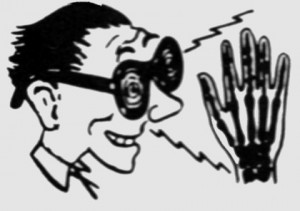New Scientist has a great article by Sally Adee about eyeglasses that help wearers accurately read the emotions of those they are looking at. It could be a boon for people with social development disorders and kind of frightening for all of us, since we have to fake our way through unpleasant situations in life in order to not offend people. What if our true feelings were laid bare at all times? How would that change who we are and how we interact?
Eventually you would think these glasses will be “worn” on the inside, as the progression for medical advancement is often external to internal. When pacemakers were first invented, they were external units that were the size of luxury sedans before becoming internal and tiny. It sounds like chips in our brains to go along with ones in our hearts. The opening of the New Scientist article:
“ROSALIND PICARD’S eyes were wide open. I couldn’t blame her. We were sitting in her office at the Massachusetts Institute of Technology’s Media Lab, and my questions were stunningly incisive. In fact, I began to suspect that I must be one of the savviest journalists she had ever met.
Then Picard handed me a pair of special glasses. The instant I put them on I discovered that I had got it all terribly wrong. That look of admiration, I realised, was actually confusion and disagreement. Worse, she was bored out of her mind. I became privy to this knowledge because a little voice was whispering in my ear through a headphone attached to the glasses. It told me that Picard was ‘confused’ or ‘disagreeing.’ All the while, a red light built into the specs was blinking above my right eye to warn me to stop talking. It was as though I had developed an extra sense.
The glasses can send me this information thanks to a built-in camera linked to software that analyses Picard’s facial expressions. They’re just one example of a number of ‘social X-ray specs’ that are set to transform how we interact with each other. By sensing emotions that we would otherwise miss, these technologies can thwart disastrous social gaffes and help us understand each other better. Some companies are already wiring up their employees with the technology, to help them improve how they communicate with customers. Our emotional intelligence is about to be boosted, but are we ready to broadcast feelings we might rather keep private?”

